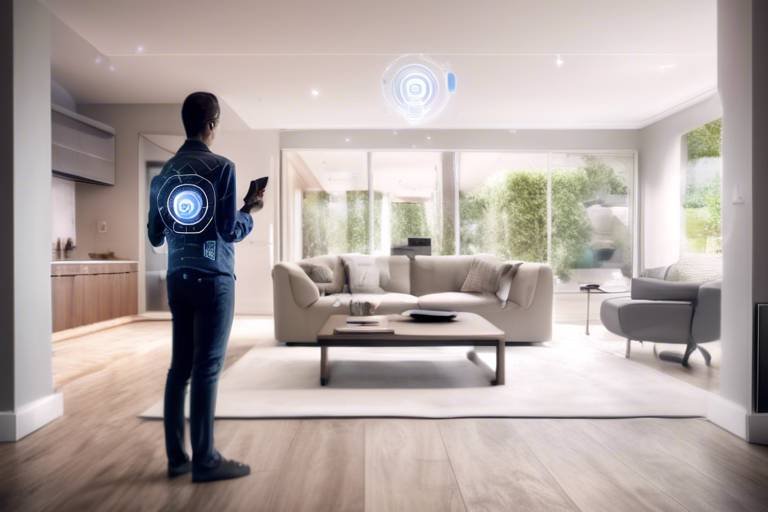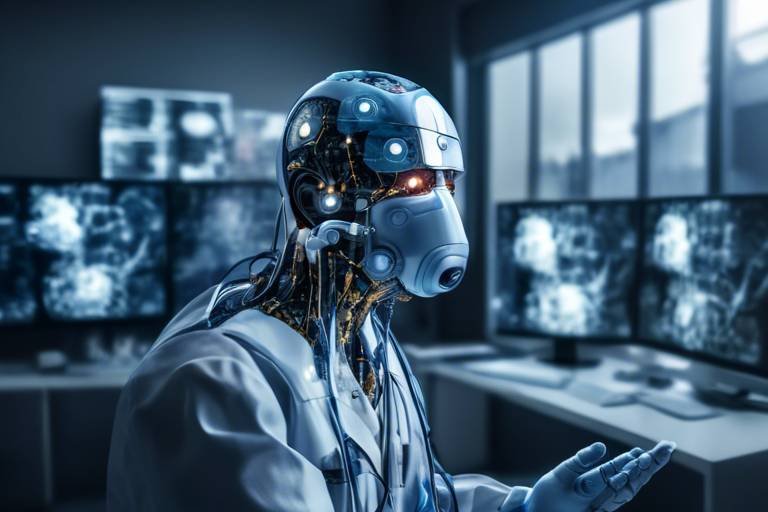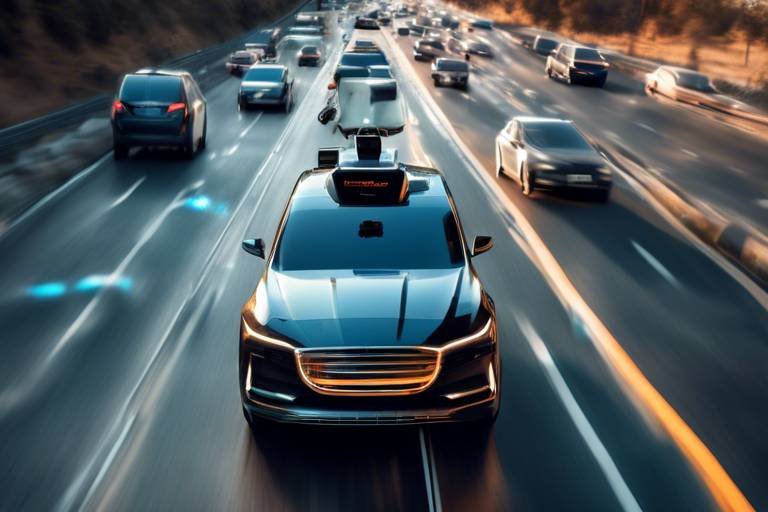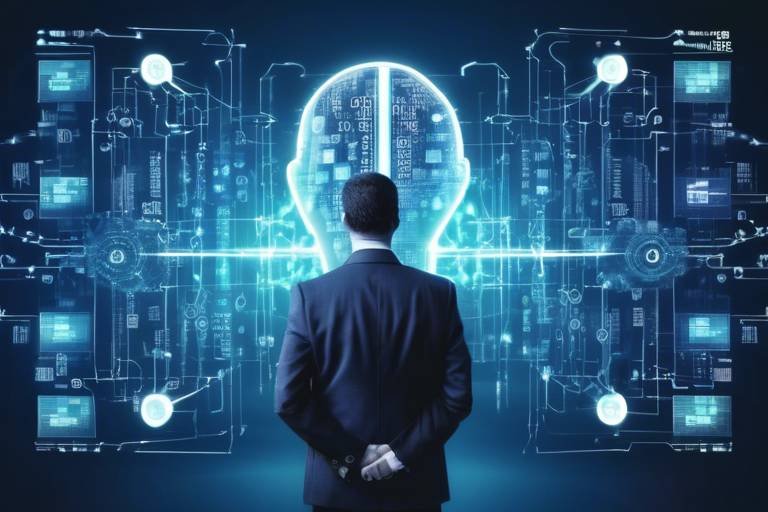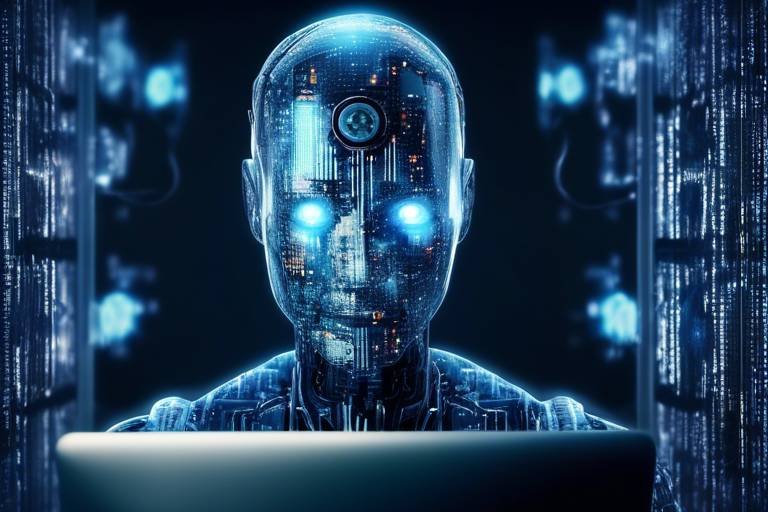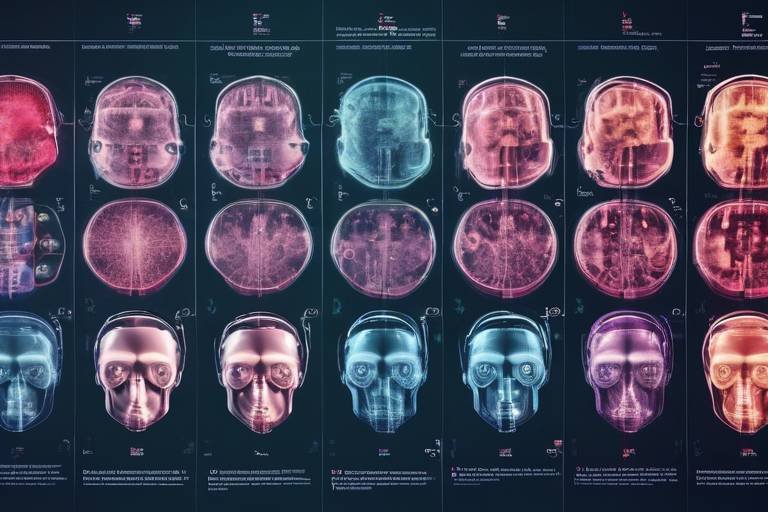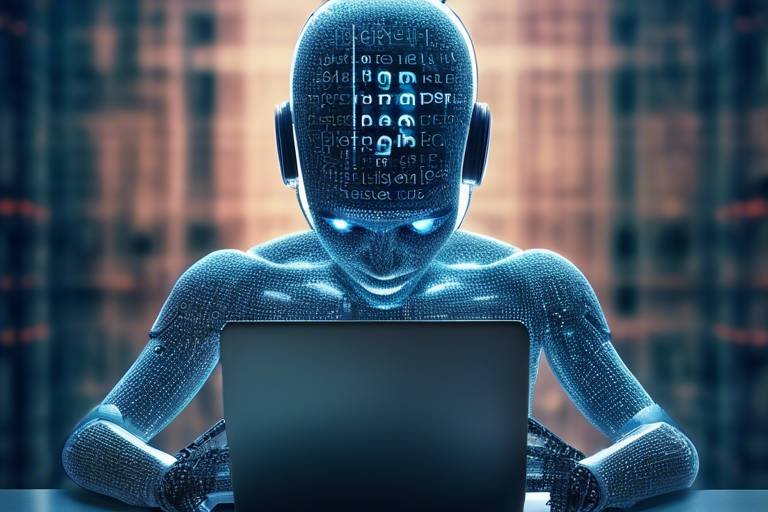The Impact of AI on Smart Homes
In recent years, the rise of artificial intelligence (AI) has dramatically transformed various aspects of our lives, and smart home technology is no exception. Imagine walking into your home, and the lights adjust automatically to your preferred brightness, the thermostat sets the perfect temperature, and your favorite music starts playing—all without you lifting a finger. This is not just a fantasy anymore; it's the reality that AI is creating for homeowners around the globe. As we delve into the world of smart homes, we'll explore how AI enhances not only convenience but also security and energy efficiency. However, with these advancements come important considerations regarding privacy and the future of our interconnected lives.
The integration of AI into smart home devices has revolutionized the way we interact with our living spaces. These devices, ranging from smart speakers to thermostats, are designed to connect to the internet, allowing users to control and monitor their home environments remotely. This connectivity leads to an increased sense of control and efficiency, making daily tasks simpler and more enjoyable. AI takes this a step further by learning from user interactions, ultimately creating an environment that feels personalized and intuitive. It's like having a personal assistant who knows your preferences and anticipates your needs before you even ask!
One of the most exciting aspects of AI in smart homes is its ability to automate daily tasks. Picture this: you wake up in the morning, and your smart home has already started brewing your coffee, the blinds open to let in natural light, and the heating adjusts to a cozy temperature—all based on your previous routines. This level of automation not only enhances your comfort but also helps in reducing energy consumption. By analyzing your habits, AI can optimize the use of resources, ensuring that your home is energy-efficient and sustainable. It's a win-win situation, where you enjoy a more comfortable lifestyle while also contributing to environmental conservation.
As we look towards the future, the possibilities for AI in smart homes are truly exciting. With advancements in machine learning and the Internet of Things (IoT), we can expect even more sophisticated systems that enhance our living experiences. Imagine smart homes that can predict maintenance needs before they become problems or systems that can adapt to changes in your lifestyle, such as new family members or changes in work schedules. The potential for innovation is limitless, and it's clear that AI will play a pivotal role in shaping the smart homes of tomorrow.
However, with great power comes great responsibility. As smart homes become increasingly connected, concerns regarding data privacy and security are more relevant than ever. Homeowners must navigate the delicate balance between enjoying the conveniences of AI technology and protecting their personal information. In the following sections, we will address these privacy concerns, explore the importance of data encryption, and discuss the regulatory considerations that are beginning to emerge in this rapidly evolving field.
- What is a smart home? A smart home is a residence equipped with devices that connect to the internet, allowing for remote control and monitoring of various home functions.
- How does AI enhance smart home technology? AI enhances smart home technology by learning user preferences, automating tasks, and optimizing energy usage for improved comfort and efficiency.
- Are there privacy concerns with smart homes? Yes, as smart homes collect data, there are concerns about data privacy and security, making it essential to implement robust protection measures.
- What are some examples of AI-powered smart home devices? Examples include smart speakers like Amazon Alexa, smart thermostats like Nest, and smart security systems that use AI to monitor activities.

Understanding Smart Home Technology
Smart home technology is revolutionizing the way we interact with our living spaces. Imagine walking into your home, and the lights automatically turn on, the thermostat adjusts to your preferred temperature, and your favorite music starts playing—all without you lifting a finger. This is the magic of smart home technology, where devices and systems connect to the internet, allowing you to control and monitor your home environment from anywhere, at any time. It's like having a personal assistant who knows your preferences and caters to your needs!
At its core, smart home technology combines various devices, such as smart thermostats, lighting systems, security cameras, and appliances, all designed to work together seamlessly. These devices communicate with each other through a central hub or directly via Wi-Fi, making it possible to manage your home with just a few taps on your smartphone or voice commands. This level of connectivity leads to increased convenience and efficiency, transforming mundane tasks into effortless experiences.
For instance, consider how smart lighting works. With smart bulbs, you can set schedules, change colors, and even dim lights—all remotely. Not only does this enhance your comfort, but it also contributes to energy savings. When you can control your lights from your phone, you’re less likely to leave them on when you’re not home. This is just one example of how smart home technology is designed to make our lives easier while promoting a more sustainable lifestyle.
Moreover, the integration of smart home devices can lead to significant cost savings. By analyzing energy usage patterns, smart systems can provide insights on how to reduce consumption, helping you save on utility bills. In fact, a recent study showed that households using smart technology can reduce their energy costs by up to 30%! This not only benefits your wallet but also contributes to a greener planet.
As we delve deeper into the world of smart homes, it’s essential to recognize that the technology is continually evolving. New innovations and advancements are emerging, making it easier than ever to create a fully connected home that caters to your lifestyle. From smart refrigerators that can track your grocery inventory to security systems that provide real-time alerts, the possibilities are endless.
In conclusion, understanding smart home technology is about recognizing its potential to enhance our lives. It’s not just about convenience; it’s about creating an environment that adapts to our needs, promotes efficiency, and ultimately makes our homes a safer and more comfortable place to live. As we explore further, we will uncover the role of artificial intelligence in driving this transformation, making smart homes not just a trend, but a way of life.

AI-Powered Automation
Imagine waking up in the morning, and as soon as your eyes flutter open, the curtains gently draw back, letting the sunlight flood into your room. The temperature is just right, and your favorite morning playlist begins to play softly in the background. This is not a scene from a futuristic movie; it’s the magic of in smart homes. With the integration of artificial intelligence, our homes are becoming smarter, adapting to our routines and preferences in ways we never thought possible.
AI enables smart homes to learn user preferences and automate everyday tasks, making life significantly more convenient. For instance, your smart thermostat can analyze your daily schedule and adjust the temperature accordingly, ensuring that your home is always at the perfect climate when you arrive. It’s like having a personal assistant who knows exactly what you need, even before you do!
But that’s just the tip of the iceberg. AI can also manage lighting systems, adjusting brightness based on the time of day or your activities. Picture this: you’re watching a movie, and with a simple voice command, the lights dim to create the perfect ambiance without you having to lift a finger. This level of automation not only enhances your comfort but also contributes to energy savings. By optimizing lighting and heating based on your habits, AI can significantly reduce energy consumption, leading to lower utility bills.
Moreover, the beauty of AI-powered automation lies in its ability to personalize your living experience. For example, if you’re a night owl who enjoys working late, your smart home can adjust the lighting and temperature to suit your late-night activities. On the other hand, if you’re an early riser, it can set a cozy atmosphere for your morning routine. This adaptability makes your home feel more welcoming and tailored to your lifestyle.
In addition to comfort and efficiency, AI automation can also enhance your home security. Imagine your smart home is equipped with surveillance cameras that can learn to recognize familiar faces. If someone unusual is detected, the system can send you an alert in real-time, allowing you to take immediate action. This level of security gives homeowners peace of mind, knowing that their home is being monitored and protected even when they are away.
As we explore the future of AI in smart homes, it’s clear that automation will continue to evolve, offering even more sophisticated solutions. With ongoing advancements in machine learning and data analytics, we can expect smart homes to become even more intuitive, learning and adapting to our lifestyles with greater precision. The question is, how much smarter can our homes get? Only time will tell, but one thing is for sure: the journey has just begun!
- What is AI-powered automation in smart homes?
AI-powered automation refers to the use of artificial intelligence to control and manage home devices and systems, allowing them to learn user preferences and automate tasks for enhanced convenience and efficiency.
- How does AI improve energy efficiency in smart homes?
AI analyzes usage patterns and adjusts systems like heating and lighting to optimize energy consumption, leading to lower utility bills and a reduced carbon footprint.
- Can AI-powered automation enhance home security?
Yes, AI can improve security by using smart surveillance systems that detect unusual activities and recognize familiar faces, sending alerts to homeowners for added safety.

Personalized User Experiences
Imagine walking into your home after a long day, and the moment you step through the door, the lights dim to your favorite setting, the thermostat adjusts to your preferred temperature, and your favorite playlist starts playing softly in the background. This isn’t a scene from a futuristic movie; it’s the reality of made possible by artificial intelligence in smart homes. AI doesn’t just make your home smarter; it makes it more attuned to your lifestyle and preferences.
At the heart of this transformation is the ability of AI to analyze user behavior and adapt to it over time. For instance, if you typically lower the blinds at sunset, your smart home system will learn this habit and automate the process for you, ensuring that your living space is always comfortable without you having to lift a finger. This kind of automation not only enhances convenience but also creates a living environment that feels uniquely yours.
Moreover, AI can provide tailored recommendations based on your usage patterns. Think about it: your smart fridge could suggest recipes based on the ingredients you have, or your smart lighting system could recommend the best settings for movie nights versus reading sessions. This level of customization is what makes smart homes truly special, as they evolve with you and your family’s needs.
In addition to comfort and convenience, personalized user experiences can also extend to safety and security. For example, a smart security system can learn your family’s routine and distinguish between familiar faces and strangers, sending alerts only when it detects unusual activity. This not only enhances your peace of mind but also reduces unnecessary notifications that can lead to alarm fatigue.
As we look to the future, the potential for even more sophisticated personalized experiences is exciting. With advancements in machine learning and data analytics, we can expect our homes to become even more intuitive. Imagine a home that not only knows your preferences but also anticipates your needs before you even express them. That’s the future of smart living, and it’s just around the corner.
- How does AI learn my preferences in a smart home?
AI learns your preferences by analyzing your daily routines and interactions with smart devices, allowing it to automate tasks and customize settings over time.
- Can personalized experiences improve energy efficiency?
Yes! Personalized settings can lead to more efficient energy use, as AI optimizes lighting and heating based on your habits, reducing waste.
- What if my preferences change?
Your smart home can adapt to changes in your preferences by continuously learning from your interactions, ensuring it remains aligned with your current lifestyle.
- Are there privacy concerns with personalized user experiences?
Yes, privacy is a concern. It’s essential to implement strong security measures and understand how your data is used to protect your personal information.

Voice Assistants in Smart Homes
Voice assistants have become the heartbeat of smart home technology, revolutionizing the way we interact with our living spaces. Imagine walking into your home after a long day, and with just a simple command, the lights brighten, your favorite playlist starts playing, and the thermostat adjusts to your preferred temperature. This seamless integration of voice-activated technology not only enhances convenience but also adds a layer of sophistication to everyday tasks.
At the forefront of this innovation are popular voice assistants like Amazon's Alexa, Google Assistant, and Apple's Siri. These digital companions are designed to understand natural language, making it feel as if you're having a conversation with a friend. With the power of artificial intelligence, they can learn from your interactions, adapting to your preferences over time. For instance, if you often ask about the weather in the morning, your assistant might start providing that information proactively, saving you the need to ask.
But it’s not just about answering questions or playing music; voice assistants can control a myriad of smart devices in your home. From turning on the coffee maker to locking the front door, the possibilities are virtually endless. Here’s a quick look at some of the key functions:
- Home Automation: Control smart lights, thermostats, and appliances with simple voice commands.
- Scheduling: Set reminders, alarms, and manage your calendar hands-free.
- Information Access: Get instant answers to questions, news updates, and even trivia.
- Entertainment Control: Play music, podcasts, or audiobooks on demand.
Moreover, the integration of voice technology with smart security systems brings a new level of safety to homeowners. You can verbally command your assistant to check the security cameras or lock the doors, providing peace of mind that your home is secure. This hands-free capability is especially useful when your hands are full or when you're multitasking.
However, it’s essential to recognize that with great convenience comes great responsibility. As we embrace these intelligent assistants, we must also be aware of privacy implications. Voice assistants are always listening for their wake word, which can raise concerns about data security and unauthorized access to personal information. It’s crucial to understand how these devices collect, store, and use your data. Many manufacturers are now implementing stringent privacy measures, but staying informed and proactive is key to enjoying the benefits while safeguarding your privacy.
In conclusion, voice assistants are not just a trend; they are the future of smart homes. They enhance our living experience by providing convenience, control, and personalization. As technology continues to evolve, we can expect even more innovative features that will further integrate these assistants into our daily lives, making our homes not just smarter, but also more intuitive and responsive to our needs.

Smart Security Systems
In today's fast-paced world, ensuring the safety of your home has become more crucial than ever. Enter , the innovative solutions that leverage the power of artificial intelligence to provide homeowners with unparalleled peace of mind. These systems are not just about traditional alarms and locks; they represent a comprehensive approach to home security, integrating various technologies to create a protective shield around your living space.
Imagine a scenario where your home can detect an intruder before you even realize something is amiss. With AI-enhanced smart security systems, this is not just a dream but a reality. These systems utilize advanced surveillance cameras equipped with facial recognition technology that can distinguish between familiar faces and unknown individuals. This capability allows for immediate alerts to be sent to homeowners, ensuring that you are always in the loop about who is entering or exiting your property.
Moreover, smart security systems can be integrated with other smart home devices, creating a cohesive network that works together to enhance your safety. For instance, if a camera detects suspicious activity, it can trigger your smart lights to flash, alerting you and possibly scaring off an intruder. This interconnectedness not only heightens security but also adds a layer of convenience to your daily life.
Another significant advantage of these systems is their ability to learn and adapt. Over time, AI algorithms analyze patterns in your daily routine, allowing the system to identify what is normal and what is not. If something unusual occurs, such as a door being opened at an odd hour, the system can send an instant notification to your smartphone. This feature is especially beneficial for those who travel frequently or have long working hours, as it provides an extra layer of vigilance when you are not home.
However, while these systems offer numerous benefits, it’s essential to consider the potential challenges they may pose. For example, the reliance on internet connectivity means that any network outages could compromise your security. To mitigate this risk, many manufacturers are now offering options for local storage and backup systems that ensure your security remains intact, even during internet disruptions.
In summary, smart security systems represent a significant leap forward in home protection. By harnessing the power of AI, they provide a proactive approach to security that not only alerts homeowners to potential threats but also integrates seamlessly into the smart home ecosystem. With these systems in place, you can rest easy knowing that your home is being monitored and protected around the clock.
- What are smart security systems? Smart security systems are advanced home protection solutions that utilize AI and connected devices to monitor and secure your home.
- How do smart security systems work? They use sensors, cameras, and AI algorithms to detect unusual activities, recognize faces, and send alerts to homeowners.
- Are smart security systems reliable? Yes, they are designed to provide real-time monitoring and alerts, but reliability can depend on internet connectivity and system maintenance.
- Can I integrate smart security with other smart home devices? Absolutely! Many smart security systems can be integrated with other devices like smart lights, locks, and thermostats for enhanced functionality.

Energy Efficiency and Sustainability
In today's world, where every penny counts and environmental concerns are at the forefront, energy efficiency and sustainability have become more than just buzzwords; they are essential components of modern living. AI-driven smart home systems are revolutionizing how we manage energy consumption, making it easier than ever to reduce our carbon footprint while saving money. Imagine a home that not only learns your habits but also adjusts itself to minimize energy usage without sacrificing comfort. Sounds like science fiction, right? Well, it's happening right now!
With the integration of AI in smart home technology, homeowners can monitor and control their energy consumption in real-time. For instance, smart thermostats can learn when you're home or away and adjust heating and cooling systems accordingly. This means no more wasting energy on heating an empty house or cooling it when no one is around. In fact, studies have shown that households using smart thermostats can save up to 30% on their energy bills annually. Imagine what you could do with those savings!
Moreover, AI can analyze energy consumption patterns over time. By identifying peak usage hours and suggesting optimal times for running appliances, these smart systems can help you shift your energy use to off-peak times, when rates are lower. This not only saves you money but also reduces strain on the grid, contributing to a more sustainable energy ecosystem. For example, here’s a quick overview of how AI can enhance energy efficiency:
| Feature | Benefit |
|---|---|
| Smart Thermostats | Automatically adjust temperature based on occupancy, saving energy and costs. |
| Energy Monitoring Systems | Track real-time energy usage and provide insights to improve efficiency. |
| Automated Lighting | Adjust lighting based on natural light availability and occupancy, reducing electricity use. |
| Smart Appliances | Optimize energy use by running during off-peak hours, saving money and energy. |
Another exciting aspect of AI in smart homes is the potential for renewable energy integration. Imagine a home equipped with solar panels that not only generates energy but also uses AI to determine the best times to store energy or draw from the grid. This seamless integration allows homeowners to maximize their use of renewable resources, further enhancing sustainability.
However, it's important to remember that while AI can significantly improve energy efficiency, it requires user engagement and awareness. Homeowners must be proactive in utilizing these technologies to their fullest potential. Regularly checking energy reports, adjusting settings, and being mindful of energy use can amplify the benefits of AI-driven systems.
In conclusion, AI-powered smart home technology is not just about convenience; it plays a crucial role in promoting energy efficiency and sustainability. By adapting to our lifestyles and preferences, these systems help us make informed decisions that benefit both our wallets and the planet. So, why not embrace this technology and contribute to a greener future?
- How does AI help in energy efficiency? AI analyzes energy consumption patterns and suggests optimizations, such as running appliances during off-peak hours.
- Can smart home technology really save me money? Yes! Many users report savings of up to 30% on energy bills by using smart systems effectively.
- What is the role of renewable energy in smart homes? AI can optimize the use of renewable energy sources, such as solar panels, to enhance sustainability.
- Are there any privacy concerns with AI in smart homes? Yes, as with any connected technology, there are concerns about data privacy and security that need to be addressed.

Privacy and Security Concerns
As we embrace the wonders of smart home technology, we also find ourselves navigating a labyrinth of privacy and security concerns. With devices constantly collecting data to enhance our living experience, the question arises: how much of our personal information are we willing to share? These smart devices, equipped with AI, can learn our habits and preferences, but at what cost? While they offer unparalleled convenience, they also raise red flags regarding the safety of our data.
Imagine a world where your home knows you better than you know yourself—adjusting the thermostat just the way you like it and dimming the lights for your favorite movie. Sounds fantastic, right? But what if that same system could also expose your daily routines to potential hackers? The truth is, the more connected our homes become, the more vulnerable they can be. Cybersecurity threats are evolving, and hackers are constantly looking for ways to exploit weaknesses in smart home systems.
To mitigate these risks, it's crucial to implement robust security measures. One effective strategy is data encryption, which scrambles your information, making it unreadable to unauthorized users. Additionally, using strong passwords and enabling two-factor authentication can further protect your devices. A study by the Cybersecurity & Infrastructure Security Agency found that over 80% of breaches involve compromised passwords, highlighting the importance of strong security practices.
| Security Measures | Description |
|---|---|
| Data Encryption | Scrambles data to protect it from unauthorized access. |
| Strong Passwords | Complex passwords that are difficult to guess. |
| Two-Factor Authentication | Requires an additional verification step for access. |
Furthermore, regulatory considerations are beginning to take shape as governments and organizations recognize the need for ethical guidelines in the use of AI within smart homes. As consumers, we deserve to know how our data is being used and what measures are in place to protect it. The establishment of regulations can help ensure that companies prioritize user privacy and implement necessary safeguards against data breaches.
In a nutshell, while the benefits of smart home technology are undeniable, we must remain vigilant about our privacy and security. By taking proactive measures and staying informed about the latest developments in data protection, we can enjoy the conveniences of our smart homes without compromising our personal information. After all, a secure home is a happy home!
- What are the main privacy concerns with smart homes? Smart homes collect a significant amount of personal data, which can be vulnerable to hacking and misuse.
- How can I protect my smart home devices? Use strong passwords, enable two-factor authentication, and ensure that your devices have the latest security updates.
- Are there regulations for data privacy in smart homes? Yes, governments are working on establishing guidelines to protect consumer data in smart home technologies.
- What should I do if I suspect my smart home device has been hacked? Disconnect the device from the internet, change passwords, and consult with a cybersecurity expert if necessary.

Data Encryption and Protection
In the age of smart homes, where convenience meets cutting-edge technology, the importance of data encryption and protection cannot be overstated. As we invite devices into our homes that can control everything from lighting to security systems, we also open the door to potential vulnerabilities. Imagine your smart thermostat being hacked; not only could it lead to discomfort, but it could also compromise your privacy. This is why implementing robust encryption measures is essential.
Data encryption serves as a protective barrier, scrambling your information so that only authorized users can access it. Think of it as a secret code that only you and your devices can understand. When data is encrypted, even if a hacker intercepts it, they will see nothing but gibberish. This is crucial for sensitive information, such as your personal preferences, schedules, and even payment details for smart services.
Moreover, the protection of user data goes beyond just encryption. It involves a multi-layered approach that includes:
- Secure Connections: Always ensure that your smart devices connect through secure networks, preferably using Wi-Fi Protected Access (WPA) protocols.
- Regular Updates: Manufacturers frequently release updates that patch security vulnerabilities. Keeping your devices updated is like locking the front door of your home—it's a simple yet effective way to enhance security.
- User Authentication: Implementing two-factor authentication adds an extra layer of security, making it more challenging for unauthorized users to gain access.
As we move forward, the emphasis on data protection will likely increase. Companies are becoming more aware of the potential risks associated with smart technologies and are investing in advanced security measures. For instance, some devices now come equipped with built-in security features that monitor for unusual activity and alert homeowners in real-time.
In conclusion, the future of smart homes hinges on our ability to protect our data. By prioritizing encryption and adopting comprehensive security strategies, we can enjoy the benefits of AI technology without compromising our privacy. As homeowners, it’s crucial to stay informed and proactive in safeguarding our digital lives.
- What is data encryption? Data encryption is the process of converting information into a coded format to prevent unauthorized access.
- How can I ensure my smart home devices are secure? Use secure connections, regularly update your devices, and enable user authentication features.
- What should I do if I suspect my smart home device has been hacked? Immediately disconnect the device from the internet, change passwords, and contact customer support for assistance.

Regulatory Considerations
The rapid expansion of smart home technology powered by artificial intelligence has raised significant regulatory considerations that cannot be overlooked. As these innovations become more integrated into our daily lives, the need for a robust framework to govern their use is paramount. Governments and organizations around the globe are starting to recognize the necessity of establishing regulations that address the ethical implications of AI in smart homes. The primary aim is to ensure that while we enjoy the conveniences of these technologies, our privacy and security are not compromised.
One of the critical areas of focus in regulatory discussions is data privacy. With smart homes collecting vast amounts of personal data to enhance user experiences, there is an urgent need for clear guidelines on how this data should be handled. Consumers must have the right to know what data is being collected, how it is used, and who has access to it. This transparency is essential for building trust between consumers and technology providers.
Moreover, the implementation of data protection measures is crucial. Regulations should mandate that companies adopt stringent security protocols, such as data encryption, to safeguard user information from potential breaches. This is especially important considering the increasing sophistication of cyber threats. In a world where smart devices are constantly connected to the internet, the risk of unauthorized access to personal data is a genuine concern.
Another vital aspect of regulatory considerations is the establishment of ethical guidelines for AI development in smart homes. These guidelines should address issues such as algorithmic bias, ensuring that AI systems are designed to be fair and equitable. For instance, if a smart security system is programmed to recognize faces, it should be trained on diverse datasets to avoid discrimination against specific demographic groups. By prioritizing ethical AI practices, we can foster a more inclusive and just technological landscape.
To illustrate the importance of these regulatory considerations, consider the following table that highlights key areas of focus:
| Regulatory Focus | Description |
|---|---|
| Data Privacy | Guidelines on data collection, usage, and transparency. |
| Data Protection | Requirements for security measures like encryption. |
| Ethical AI Development | Standards to prevent bias and promote fairness in algorithms. |
As we navigate the complexities of AI in smart homes, it’s essential for stakeholders, including consumers, developers, and policymakers, to engage in ongoing dialogue. This collaboration will help shape regulations that not only protect users but also foster innovation. By addressing these regulatory considerations, we can create a future where smart home technology enhances our lives without compromising our privacy or security.
- What are the primary regulatory concerns regarding AI in smart homes?
The main concerns include data privacy, security measures, and ethical guidelines for AI development. - How can consumers protect their data in smart homes?
Consumers should look for devices that offer transparency in data handling and robust security features. - Are there existing regulations for smart home technology?
Yes, many countries are developing regulations, but they vary widely and are still evolving.

The Future of AI in Smart Homes
As we gaze into the crystal ball of technology, the future of AI in smart homes appears not only bright but also incredibly transformative. Imagine a living space that not only responds to your needs but anticipates them. With advancements in machine learning and the Internet of Things (IoT), the possibilities for enhancing our daily living experiences are virtually limitless. From smart appliances that learn your cooking habits to home systems that adjust their settings based on your daily routines, AI is set to redefine what we consider a 'home.'
One of the most exciting aspects of this evolution is the integration of predictive analytics. This technology allows smart homes to analyze vast amounts of data, learning from your behaviors and preferences over time. For instance, your smart thermostat could learn that you prefer a cooler environment in the evenings and adjust itself accordingly without you lifting a finger. It’s like having a personal assistant that knows you better than you know yourself!
Moreover, as AI continues to evolve, we can expect even more sophisticated energy management systems. These systems will not only optimize energy consumption based on real-time data but will also provide homeowners with insights into their energy usage patterns. Imagine receiving a notification suggesting that you shift your energy-intensive activities to off-peak hours, saving you money and reducing strain on the grid. This kind of smart management will not only enhance your comfort but also contribute to a more sustainable future.
However, it’s not just about convenience and efficiency; the future of AI in smart homes also promises to enhance security measures. Future smart home systems will likely incorporate advanced AI algorithms that can detect and respond to threats in real-time. For example, imagine a security system that not only alerts you to suspicious activity but can also differentiate between a family member returning home and an unknown visitor. This level of intelligence could provide homeowners with unprecedented peace of mind.
As we look forward, we must also consider the interoperability of devices. The future will likely see a more unified ecosystem where devices from different manufacturers communicate seamlessly with one another. This means your smart fridge could talk to your smart oven, suggesting recipes based on what you have available and even preheating itself while you’re on your way home from work. The integration of various devices will create a more cohesive and user-friendly experience, making the smart home truly smart.
In summary, the future of AI in smart homes is not just about making our lives easier; it's about creating an environment that is responsive, secure, and sustainable. As we embrace these changes, we must also remain vigilant about the ethical implications of such technology. Balancing innovation with privacy and security will be crucial as we move forward into this exciting new era of smart living.
- What are some examples of AI applications in smart homes? AI applications range from smart thermostats that learn your heating preferences to security cameras that can distinguish between family members and intruders.
- How does AI improve energy efficiency in smart homes? AI analyzes usage patterns and suggests optimal settings for devices to reduce energy consumption, ultimately lowering utility bills.
- Are there privacy concerns with AI in smart homes? Yes, as smart homes collect data, there are concerns about how that data is used and protected. It's crucial to implement robust security measures.
- What is the role of voice assistants in the future of smart homes? Voice assistants will continue to be integral, allowing for hands-free control of devices and enhancing user interaction with the smart home ecosystem.
Frequently Asked Questions
- What is a smart home?
A smart home is a residence that uses technology to enable remote management and monitoring of systems and appliances. This includes lighting, heating, security, and entertainment systems that can be controlled via the internet, making life more convenient and efficient.
- How does AI enhance smart home technology?
AI enhances smart home technology by learning user preferences and automating tasks. For instance, it can adjust lighting and temperature based on your routine, creating a personalized living experience that not only improves comfort but also reduces energy consumption.
- What role do voice assistants play in smart homes?
Voice assistants like Alexa and Google Assistant serve as the central hub for controlling smart devices. They allow users to manage their home hands-free, set reminders, and access information effortlessly, making everyday tasks much simpler.
- Are smart home security systems reliable?
Yes, smart home security systems powered by AI are quite reliable. They can detect unusual activities, send alerts, and even recognize familiar faces, providing homeowners with enhanced security and peace of mind.
- How can smart homes contribute to energy efficiency?
Smart homes contribute to energy efficiency by utilizing AI to analyze energy usage patterns. They can suggest adjustments to minimize waste, leading to lower utility bills and a reduced carbon footprint, making them more sustainable.
- What are the privacy concerns associated with smart homes?
Privacy concerns in smart homes primarily revolve around data security and unauthorized access to personal information. As these homes collect and transmit data, it's crucial to implement strong security measures to protect user privacy.
- What measures can be taken to protect data in smart homes?
To protect data in smart homes, users should implement robust data encryption, regularly update device firmware, and use strong, unique passwords for their smart devices. These steps help safeguard personal information from potential breaches.
- Are there regulations governing AI in smart homes?
Yes, there are emerging regulations and guidelines aimed at ensuring the ethical use of AI in smart homes. These regulations focus on protecting user privacy while encouraging innovation in the industry, creating a safer environment for consumers.
- What does the future hold for AI in smart homes?
The future of AI in smart homes looks bright, with advancements in machine learning and IoT expected to enhance user experiences, improve energy management, and introduce new functionalities that make homes even smarter and more efficient.

